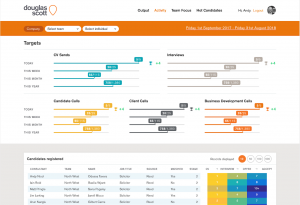Covid as a Catalyst for Transformation

Andy Nicol
Andy Nicol is MD of Sputnik Digital, an innovation and digital engineering agency helping companies identify, build and maintain transformation programmes using technology.
He has helped optimise both customer facing and internal processes for clients incliuding GoCompare, Swinton Insurance, Fluent Money and Acino Pharma.
Having worked in the industry since 1998, Andy has built up experience in areas including design, development, UX and cloud services, and is able to share his view on how he has seen this deployed across a wide range of sectors.
Covid as a Catalyst for Transformation
Covid-19 has made sure digital transformation is a permanent agenda item in every sector.
The inertia of implementing systems and processes to enable home working has now received the external force it needed. It now has momentum to its advantage.
This one change alone means the demand for office space and public transport will never return to previous levels. Even a low double digit drop in such fundamental ways of life will have impacts on town planning, re-use of buildings and the commuter economy.
The increase in demand for delivery services has catapulted the share price of Ocado and ASOS to new heights, and the might of Uber Eats and Deliveroo could drive your local takeaway into “dark kitchens”.

Meanwhile, electric (and hydrogen) cars are booming, faster vaccine development methods are being developed, education is being both democratised and delivered online.
With all of this is the accelerated expectation from consumers, employees and organisations to be able to do what they need to, when they want, from wherever they are.
By the time the world gets back to normal, technology, habits and culture will have changed to the point where daily lives simply won’t be the same as they were in Q1 2020.
As if it hasn’t been clear for the last 20 years, embracing digital is not an option.
Embrace Innovation
The winners over the next few decades will be those that embrace innovation, and create a business culture and technical capability to adapt quickly.
Realisation across most industries that it’s now or never will be dampened by the dwindling reserves and gloomy forecast.
Although the desire is there to pursue transformation strategies, many businesses will be struggling to keep the lights on, never mind funding ambitious digital programmes.
So, while the post-Covid era brings opportunity, it will be easier said than done.
The outcome will be a widening of the gap between those that have already begun their digital transformation programmes, and those for whom it may already be too late.
Many businesses see “digital” in the context of marketing – websites, social media, SEO and social media.
Although these are the ones that get the most press, they are a small slice of the tech space.
Online banking, Xero and Uber are all examples of ways of “doing” rather than “promoting”. Digital transformation allows businesses to become more efficient, and more effective.
A good digital transformation strategy doesn’t need huge investment.
In fact, the best strategies involve manageable investments which enable revenue or cost savings that can be continually re-invested. Like reinvesting dividends, the impact over time can be transformational.
An obvious place to start is in “customer self serve” – allowing your customers to sign documents, place orders, verify identity or access manuals online.
However, there are as many opportunities to develop internal tools to surface management information, manage stock levels, identify trends, optimise pricing and compile complex reports aggregating credit information, maps and property searches.
The easy wins often lie in enriching internal data with the plethora of services available to plug into, including fulfillment and logistics, digital ID&V and cloud services.
The new platform can either be presented in a unique dashboard, or have no user interface whatsoever, but simply triggering actions without the bottleneck of waiting for a human.
New York based RXR Realty developed an app that provided residents with the ability to manage move scheduling, deliveries, dog walking and rent payments. Commercial tenants were enabled by real-time analytics on heating, cooling, and floor space optimisation.
As well as the increased customer satisfaction and operational efficiencies these tools delivered, it also put RXR in a strong position for scalable, socially distanced operations during Covid.
Case Study – Douglas Scott Recruitment
Manchester based legal recruitment company (and Sputnik client), Douglas Scott, have pioneered an internal tool to help their consultants better manage their activity and deliver better service to both candidates and clients.
We worked with Douglas Scott to design and build a bespoke dashboard on top of the existing CRM to surface key activities, reminders and gamified daily, weekly, monthly and annual targets.
Fig 1: Douglas Scott Recruitment Consultant Dashboard
This saved their consultants time by providing a more intuitive interface, and ensured candidates and clients received follow ups at the right time resulting in an increase in placements.
The Discovery Phase
To succeed, businesses need to realise the need for change, and be ready to commit time and resources to starting the journey.
The first step is often a discovery phase to help document and understand the current situation, the opportunity, and the roadmap to get from one to the other.
Digital transformation needs a muti-discipinlary team of business analysts, strategists, several types of developer, product managers, designers and testers.
A reputable digital transformation partner will work with you to identify what you can do in-house, what additional skills you need, and be able to provide them on a cost effective, as needed basis until such time as you’re ready to scale your internal team.
Next Step
You should look to review your current processes and marketing budget and start the journey with the discovery phase that will identify the obvious areas to streamline.
Following the discovery phase, the design, development and integration stages will allow you to work out the scope of your project, we would recommend an initial pilot scheme, and set a budget with your chosen provider for anywhere from £5,000 to a larger six-figure sum depending on the ambition of the project.
If you would like a conversation about the items raised above and how it can apply to your business please contact:
Andy Nicol
t: 07713 119699
Twitter: @sputnikdigital
Connect on: LinkedIn
 |
| 

